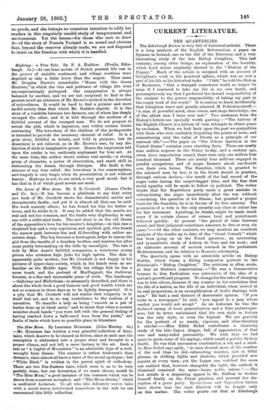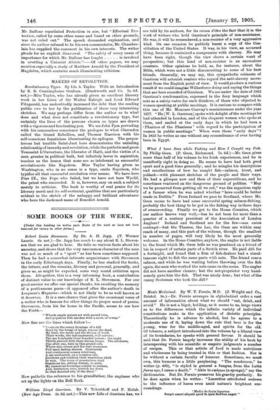THE QUARTERLIES.
The Edinburgh Review is very full of historical articles. There is a long analysis of the English Reformation, a paper on Spenser in Ireland, one on the fall of the Directory, and a very interesting study of the late Bishop Creighton. This last contains, among other things, an explanation of the hostility which Lord Acton originally showed to the " History of the Papacy." Much of the article is occupied with an account of Creighton's work in the practical sphere, which was as real a part of his life as his historical tasks. " I felt," he told the Bishop of Rochester, " that a tranquil conscience could no longer be mine if I ventured to take my life in my own hands, and presumptuously say that I preferred the inward responsibility of the student to the graver responsibility of taking my part in the rough work of the world." It is curious to learn incidentally that Creighton knew and greatly admired M. Pobiedonostzeff,— " a man of powerful mind, clear vision, and large knowledge, one of the ablest men I have ever met." Two sentences from the Bishop's letters are specially worth quoting :—" The history of the English Church is a history of vain attempts to obtain peace by exclusion. When we look back upon the past we sympathise with those who were excluded, forgetting the points at issue, and remembering only the value of liberty as a principle of our national life."—The paper on "The Colour Question in the United States " contains some startling facts. There are nearly nine million negroes in the States to-day, and a century ago, when slave importation ceased, there were only one million four hundred thousand. There are nearly four millions engaged in gainful occupations, and of negro farmers about one-fourth own their own farms. The franchise, which is granted to
• the coloured man by law, is in the South denied in practice, through various devices,—the result of the bad record of the negro voter during the carpet-bagger time, and the fear that social equality will be made to follow on political. The writer thinks that the Republican party made a great mistake in enfranchising the negro immediately after the war without considering the question of his fitness ; but granted a proper basis for the franchise, he is in favour of its free exercise. The possession of a vote is the only security any class or colour has for fair treatment. Lynching, he thinks, might be made much rarer if in certain classes of crimes trial and punishment followed quickly. At present " the period of time between arrest and final judgment sometimes amounts to five or even six years."—Of the other contents, we may mention an excellent analysis of the results up to date of the "Great Consult" which has been going on on the Fiscal question ; an interesting and sympathetic study of Aubrey de Vere and his work ; and an elaborate account of modern research in the prehistoric Mediterranean, and its relation to Homeric scholarship.
The Quarterly opens with an admirable article on Bishop Stubbs, which forms a fitting companion portrait to the Edinburgh's " Bishop Creighton." The criticism is often acute, as this on Stubbs's conservatism :—" He was a Conservative because to him Radicalism was subversive of the idea of a nation's growth and progress. To change for the sake of changing was to him odious, because it ran counter to his conviction that the life of a nation, as the life of an individual, when viewed in its real proportions, is an exemplification of God's dealings with men." He had a real distrust of democratic opinion. " If you write to a newspaper," he said, " you appeal to a jury whose verdict you would not accept." As an historian he was the declared enemy of loose generalisation and a false picturesque- ness, but he never maintained that his own style in history was the only style, or even the highest. We are grateful for the portrait of so manly, vigorous, and clear-thinking a scholar.—Miss Edith Sichel contributes a charming study of the late Canon Ainger, full of appreciation of that rare and many-sided personality. We wish that we had space to quote some of his sayings, which recall a gentler Sydney Smith. He was that uncommon combination, a wit and a saint. As Miss Sichel says aptly, " no man showed more of the weather of the soul than he did—interesting weather, rich in fitful gleams, in shifting lights and shadows, which provided new aspects at every turn; yet the longer one watched the more one realised that, however changeful the light, the outlook it illumined remained the same—large, noble, serene."—The last article is a despairing appeal to Mr. Balfour to declare himself finally on the Fiscal question, and prevent the dis- ruption of a great party. By-elections and Opposition tactics have shown that the next Election will be fought only on this matter. The writer points out that at Edinburgh
Mr. Balfour. repudiated Protection in aim, but "Effectual Pro- tection, called by some other name and based on other grounds, was not ruled out." The speech demanded explanation, and since its author refused to be his own commentator, Mr. Chamber- lain has supplied the comment in his own interests. The writer pleads for an explicit disavowal. "The safety of every cause of
importance for which Mr. Balfour has fought is involved in averting a Unionist debacle."—Of other papers, we may mention especially a study of Matthew Arnold by the President of Magdalen, which contains much illuminating criticism.























































 Previous page
Previous page